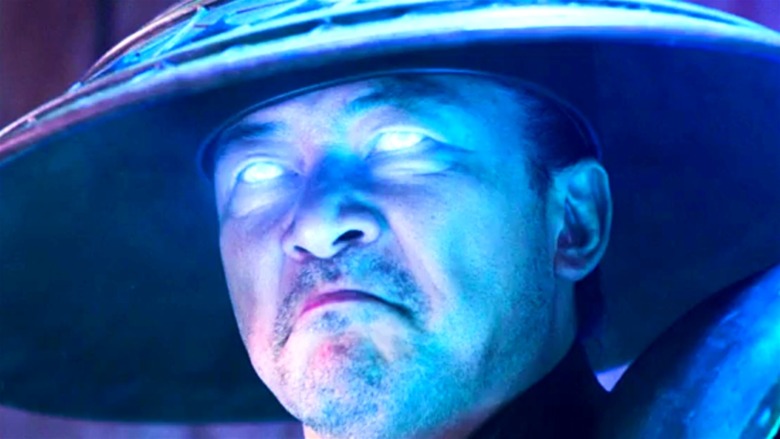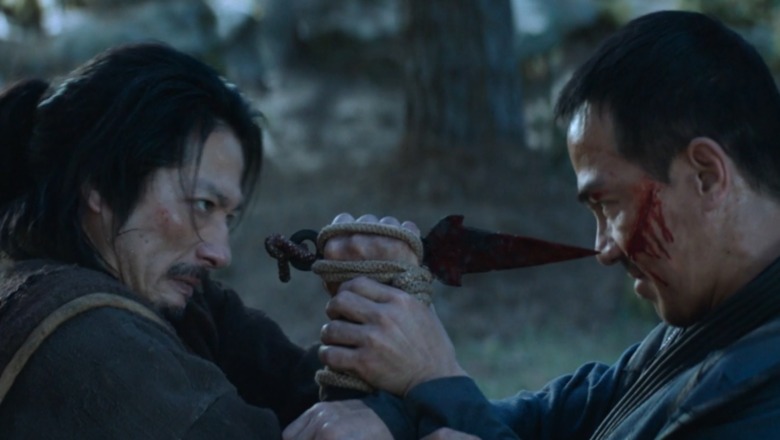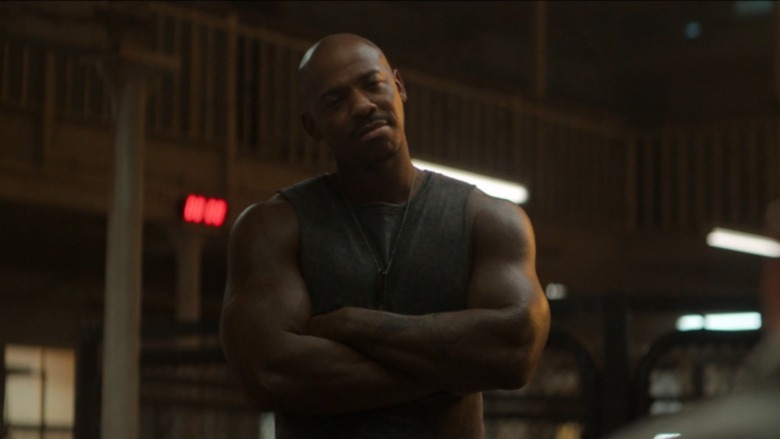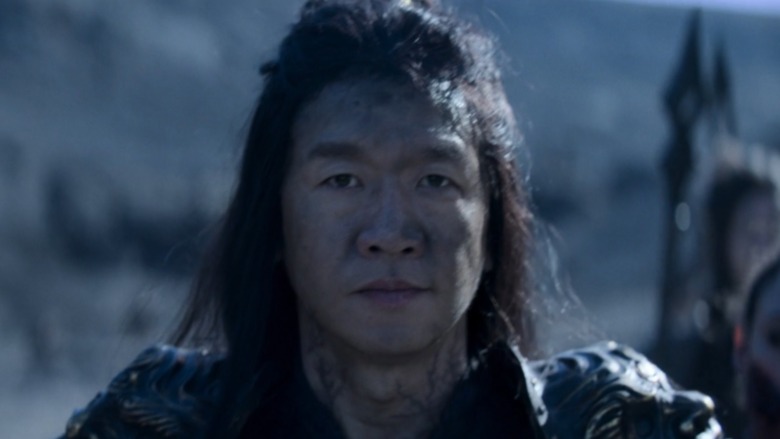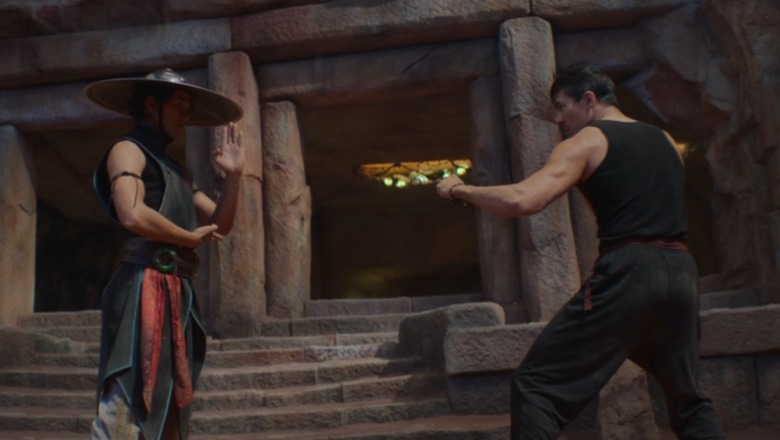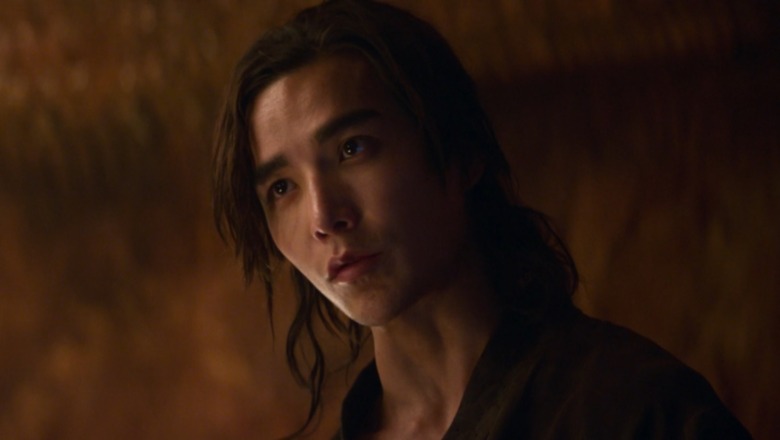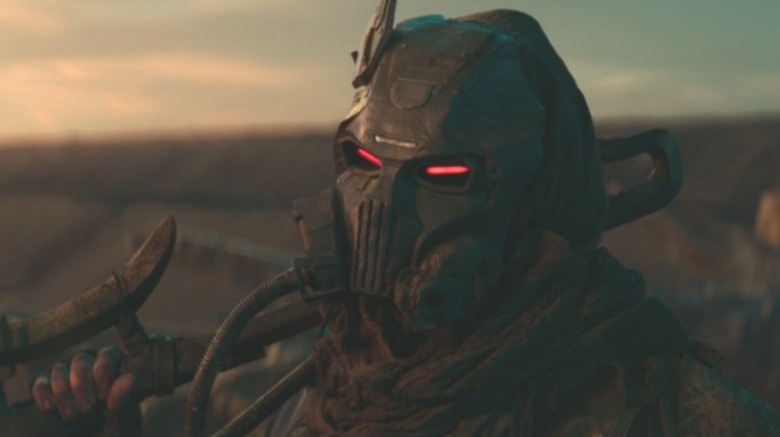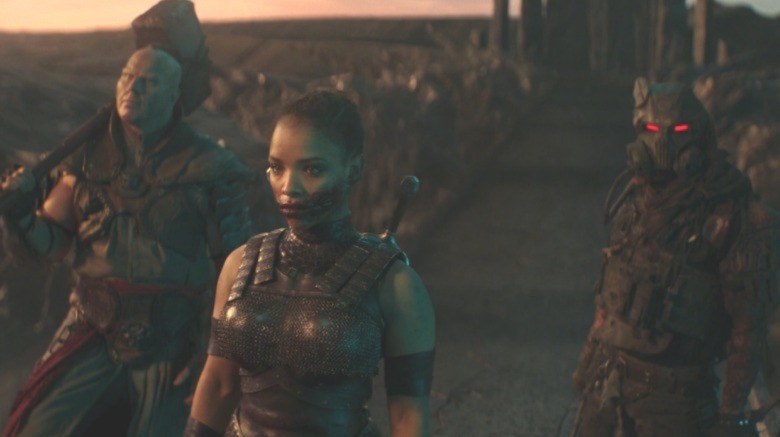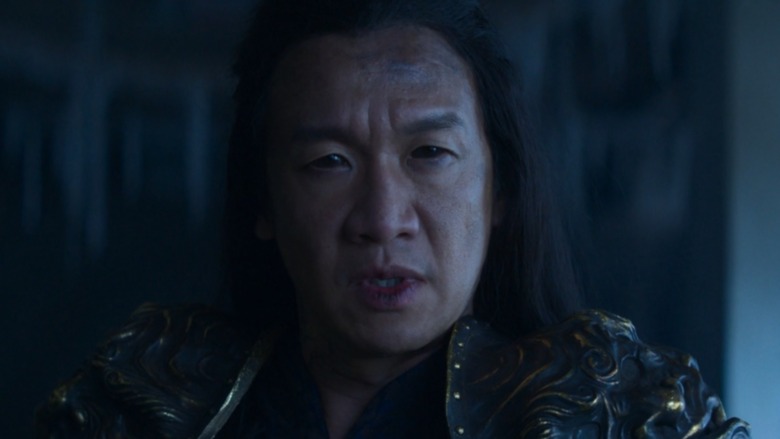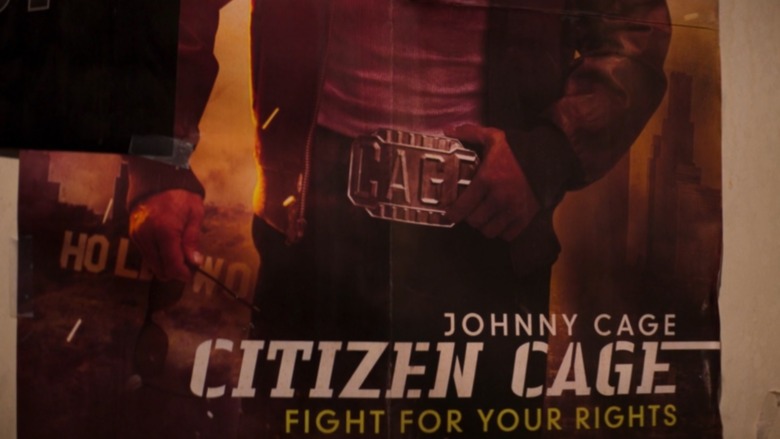Lines In Mortal Kombat With More Meaning Than You Realize
The "Mortal Kombat" video games are full of iconic lines, many of which found their way into the recently released live-action film adaptation. Declarations like "Fatality" and "Flawless victory" were worked into the movie's script to give fans of the games a few cheeky nods and winks.
Throughout the film, there are also a plethora of lines that contain subtle references, nods to character backstories, and even bits of possible foreshadowing of things yet to come in the burgeoning film franchise. Whether you're a superfan of the games or a total newbie, there are likely a few of these meaningful chunks of dialogue that went over your head. Considering how many Easter eggs there are to keep track of in the film, that's pretty understandable.
Here are the lines in "Mortal Kombat" that have a deeper meaning than first meets the eye. And although we loved Kano's (Josh Lawson) MC Hammer and "Harry Potter" references, we're going to stick to the ones that have a little more significance to the story.
Scorpio and Sub-Zero's beef isn't just about them
One of the central narrative arcs in the "Mortal Kombat" movie is the rivalry between Hanzo Hasashi aka Scorpion (Hiroyuki Sanada) and Bi-Han aka Sub-Zero (Joe Taslim). The film opens with Bi-Han killing Hanzo's entire clan, family, and then the man himself. Before he does, Bi-Han says, "This day has been a long time coming ... the end of your bloodline. Your mighty clan, the Shirai Ryu, have been exterminated by me."
With this line, the movie is fast-tracking the backstory of Scorpion and Sub-Zero's clans and their long simmering blood-feud. In the world of the games, this story is rich with detail. The Shirai Ryu clan itself is actually an offshoot from Sub-Zero's, called the Lin Kuei, which began when a member defected and started amassing their own followers. The Lin Kuei did not take this defection lightly and made it their mission to wipe the new Shirai Ryu clan out of existence. Hence, Sub-Zero's bloody mission.
Considering this is just one of several storylines in the movie, keeping the details light makes sense. However, Scorpion and Sub-Zero's rivalry goes far deeper than the two men's personal hatred for one another.
Eddie Tobias isn't a real MMA fighter, but that doesn't mean the name isn't significant
Cole Young (Lewis Tan), the once successful MMA fighter who now can't win a match, is a character who was invented for the movie and serves as the audience's way into the story. He's first approached about the Mortal Kombat tournament by Major Jax Briggs (Mehcad Brooks) after an unsuccessful fight. However, despite the fact that we just saw Cole take a pretty decisive L, Jax refers to him as "The man that took the belt from Eddie Tobias."
The line is delivered in a manner that is clearly meant to make it seem like Eddie Tobias is a formidable MMA fighter, and the fact that Cole once robbed him of a title means he was much more successful in his younger years. But that's besides the point. The name itself is also meant to be a loving reference to Ed Boon and John Tobias, the developers who are credited with creating the first "Mortal Kombat" game and birthing the franchise.
Who are the Elder Gods?
Another deep concept that gets a cursory mention in the movie is that of the Elder Gods. When Shang Tsung (Chin Han) is preparing to assassinate the Earthrealm warriors, Mileena (Sisi Stringer) pushes back by asking, "What of Lord Raiden? If he discovers we're breaking rules set in stone by the Elder Gods."
The Elder Gods are deific beings whose job is to ensure balance among the many realms by using non-interventionist methods, which Lord Raiden alludes to later in the film. However, despite Mileena's fear of them retaliating against Shang Tsung for breaking the rules they've set, the Elder Gods themselves are not all powerful. Similar to the pantheon of Greek deities, the Elder Gods are significantly more human in the way they operate than other interpretations of a divine and omniscient being. The Elder Gods Shinnok (who is technically a fallen Elder God, but we'll count it) and Cetrion have even been playable characters in the game series.
Considering the Amulet of Shinnok appeared as an Easter egg moment in the movie, we'll be curious to see how much of a role the Elder Gods play in the film series going forward.
Kung Lao's words of encouragement are a throwback to the first game
When the Earthrealm warriors find Raiden's temple, Cole and Kano are quickly put on an intense training regime in order to build their skill and unlock their arcana abilities. As Kung Lao begins to put the would-be defenders of the realm through their paces, he says, "All you can do now is test your might."
That line is pretty straight forward in the context of the movie but it's also a sly reference to the first "Mortal Kombat" game. Between fights, players would occasionally be tasked with competing in a button mashing minigame called "Test Your Might," wherein you had to make your character punch through blocks of wood and other strong materials in order to score points. The feature was absent from subsequent games until it was reintroduced in "Mortal Kombat: Deadly Alliance." The nonchalant callback in the 2021 movie seems like an Easter egg left specifically for players whose love of the games goes all the way back to the first.
The true story of Liu Kang's mentor
Although Liu Kang (Ludi Lin) has been featured as the protagonist for many of the games and movies in the "Mortal Kombat" universe, he plays more of a supporting role in the 2021 film. He still gets the opportunity to shine some light on his backstory, though. While speaking with Cole between training sessions, he reveals, "Unlike Kung Lao, I was just a worthless stray. For reasons beyond my ken, master Bo' Rai Cho found me half-dead in a gutter and brought me to the Wu Shi academy."
Like many of the franchise's characters, Liu Kang's backstory got fleshed out considerably as the series went on. The 2002 game "Mortal Kombat: Deadly Alliance" introduced the character Bo' Rai Cho, the Outworld martial arts grandmaster who turned his back on his home-realm to train Earthrealm warriors like Liu Kang and Kung Lao at the Wu Shi academy. Bo' Rai Cho's status as an Outworlder on the side of Earthrealm makes him a significant character in the general lore of the games, especially considering Liu Kang secured several Earthrealm victories in the Mortal Kombat tournaments. The Wu Shi academy itself goes on to become the site of significant deadly battles and betrayals.
If the movie series continues, don't be surprised if we eventually travel to the Wu Shi academy and meet Bo' Rai Cho in the flesh.
The movie gives Kabal and Kano a different backstory
The roster of kombatants in the "Mortal Kombat" games is extensive. While many have fascinating histories and storylines, there are only a handful that have real significance to the broader arc of the story. The 2021 film smartly brings in several that are less important as fatality fodder, one of those being Kabal (Daniel Nelson and Damon Herriman).
In the movie, Kabal is introduced as an assassin working for Shang Tsung and an associate of Kano's. He even says of his old frenemy, "He's the reason I live in an iron lung." Kabal's distinct mask and breathing apparatus have been a hallmark of his character since he was first introduced in "Mortal Kombat 3." However, while the movie implies that Kano caused the injuries that put Kabal in his iron lung, in the games, the story is a bit different.
In 2009's "Mortal Kombat," a reboot that retells the story of the first three games, Kabal is a police officer who sustains grievous injuries during Outworld's invasion of Earthrealm. He's found by Kano, who Kabal used to be in the Black Dragon crime syndicate with, who fits him with his respirator that allows him to breath despite the damage to his lungs. So, in the games, Kano quite literally puts Kabal in his iron lung, but only to save his life (and to try and bring him back to the dark side).
This may not be the last we see of Shang Tsung's warriors
Although Raiden's warriors feel outmatched by Shang Tsung's collection of assassins, the former ends up pretty much wiping the floor with the latter. Goro, Kabal, Mileena, Reiko, Nitara, and Sub-Zero all end up on the receiving end of a fatality. That doesn't seem to bother Shang Tsung too much, though. Shortly before the credits roll, he announces, "Today you have killed my warriors and you think you have won. But death is only another portal."
The "Mortal Kombat" games have featured several narrative arcs wherein previously slain characters rise from the dead. In "Mortal Kombat 3," Shang Tsung helps resurrect Sindel, the wife of Outworld Emperor Shao Kahn, from her supposedly eternal slumber. Similarly, "Mortal Kombat X" saw multiple dead characters return as mind-controlled versions of their former selves known as Revenants.
Shang Tsung's words at the end of "Mortal Kombat" are not an empty threat and could very well be foreshadowing that characters who died in the first movie may return for its possible sequels.
Other reasons to not disregard Shang Tsung's threats
Before he disappears back to Outworld at the end of the movie, Shang Tsung menaces the Earthrealm warriors with a warning: "Next time I see you I will not bring fighters, I will bring armies." Similar to his comments about his undying warriors, this particular threat is not one to take lightly.
While the first two "Mortal Kombat" games tell stories that are relatively contained to the eponymous tournaments, "Mortal Kombat 3" features all out war. The plot of the game sees the Outworld Emperor Shao Khan enlisting Shang Tsung to pull some trickery that ends with the emperor invading Earthrealm with armies of Outworld warriors.
If the movies are loosely following the events of the games, that particular storyline likely won't come for a while, as 2021's "Mortal Kombat" takes place before the action of the first game. But regardless, if or when the Outworld invasion happens in the films, Shang Tsung's threat to come back with armies is not an idle one.
The ending of Mortal Kombat teases a future appearance by Johnny Cage
Despite the cast ballooning out to include dozens upon dozens of characters, the original "Mortal Kombat" had a relatively intimate roster. There were just seven playable fighters and three special bosses included in the game. All ten of those characters made an appearance in the 2021 film except for one: the vain martial artist and movie star Johnny Cage, who entered the first "Mortal Kombat" tournament as a PR ploy to prove he does his own stunts.
Cage doesn't make a physical appearance in the first movie, but based on the ending, fans will be seeing him if there's a sequel. After defeating Shang Tsung's forces, we see Cole in the locker room of the MMA arena when he's approached by his fight booker. He declines the man's offer to appear in a matchup, saying that he's off to Hollywood. The man replies, "Hollywood? What the hell's in Hollywood?"
Fans of the series likely knew the answer to that question as soon as it was asked. But to hammer home reference, the camera lingers on a poster for a movie starring Johnny Cage right before the credits roll.
